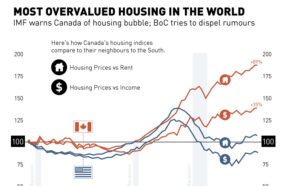House Prices in Canada
A new report shows house prices in Canada jumped 25% over last year. This unprecedented increase is being fueled by an unprecedented shortage of housing and a growing economy. Although there are plenty of homes on the market, the lack of inventory is resulting in bidding wars. A tight supply of housing means that prices are rising, putting more Canadians in rent or carpooling. But, this can only last so long. The trend is expected to continue into the coming years.
The Royal LePage House Price Survey released today shows that average home prices increased 21.4% year-over-year, to $749,800 during the third quarter of 2021. However, the report also says that market activity is slowing down in many cities, partly due to a chronic shortage of inventory. Moreover, the summer slowdown contributed to the overall slowdown in market activity. Nevertheless, the overall trend is encouraging.
In 2019, the Canadian housing market is expected to remain strong. The national average house price is expected to rise by 9.1% year-over-year, according to the latest estimates by CREA. The outlook for 2021 is also promising, with average House Prices in Ontario and Quebec forecasting 13.6% y-o-y increases and 7.4% y-o-y growth. The housing market in Canada remains weak, despite the recent increase in the price of new homes.

House Prices in Canada Jump 25% Over Last Year
The recent improvements in the Canadian housing market are a positive sign for the market. New listings have recovered in most markets, with average prices in Toronto and Montreal exceeding five-year averages. However, the lack of new listings has eroded active inventory, which is already low. The lag between supply and demand has contributed to the weaker real estate market in Canada. This trend is likely to continue through COVID-19. The overall price of homes in Canada is expected to remain steady, and some regions are more expensive than others.
Despite the recent decline in house sales in Canada, house prices have continued to rise. In Alberta, prices rose by 10.6% year-over-year. In Ottawa, the average price of a house in this province was $101,200 in March. In Toronto and Ottawa, the average property price in 2020 will be $1307,600. The highest prices are expected in Vancouver and Calgary, where the median property price is $206,388.
In the last quarter of 2018, the Halifax housing market had a stronger than normal third quarter, but was generally quieter than the first half of the year. Several factors contributed to the upward pressure on house prices, including lower inventory levels. The Bank of Canada’s last report on housing trends showed that the country’s biggest cities remained the most expensive places to buy houses. This is a good sign for the economy, and Canadians can afford to invest in real estate in any region.